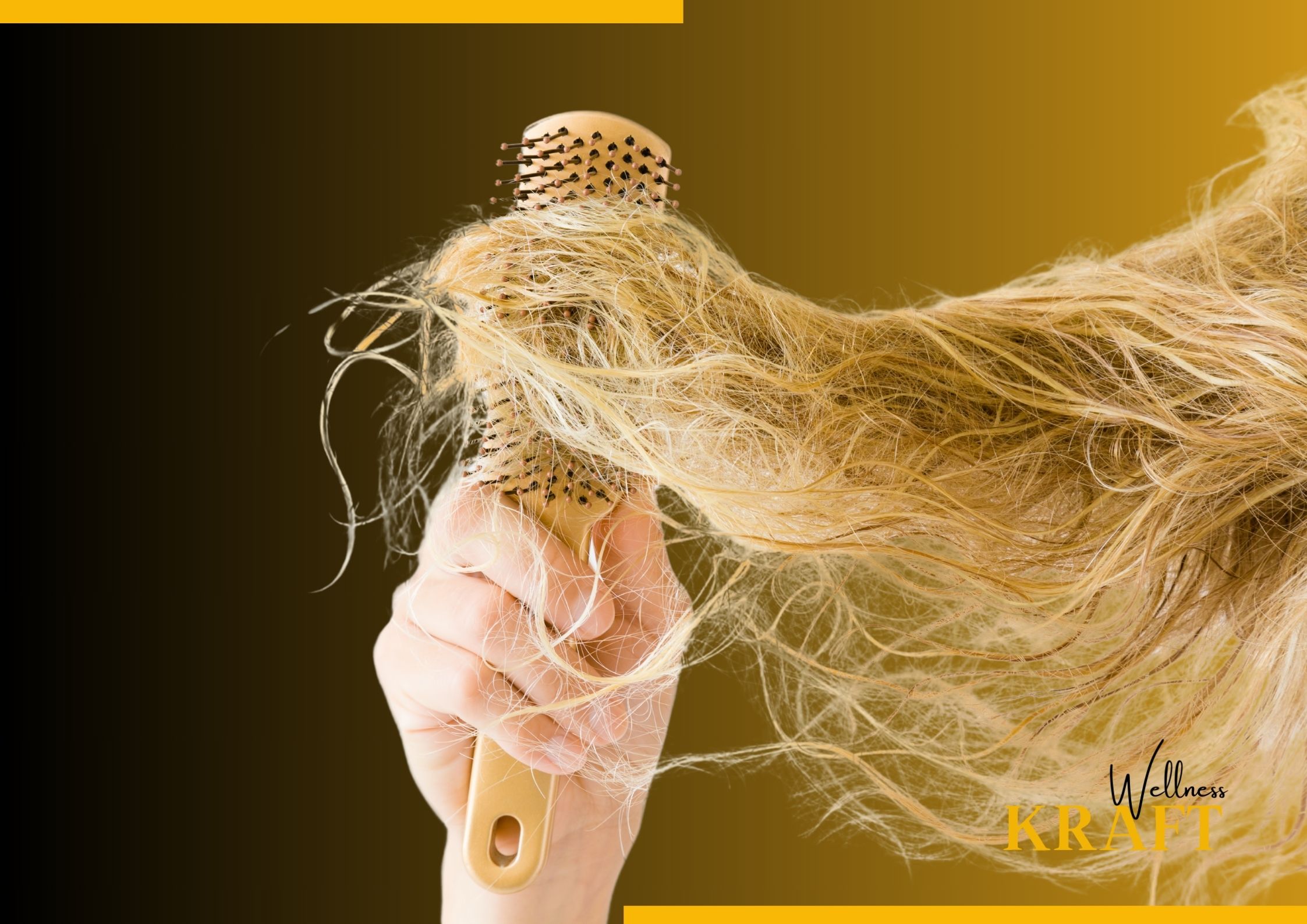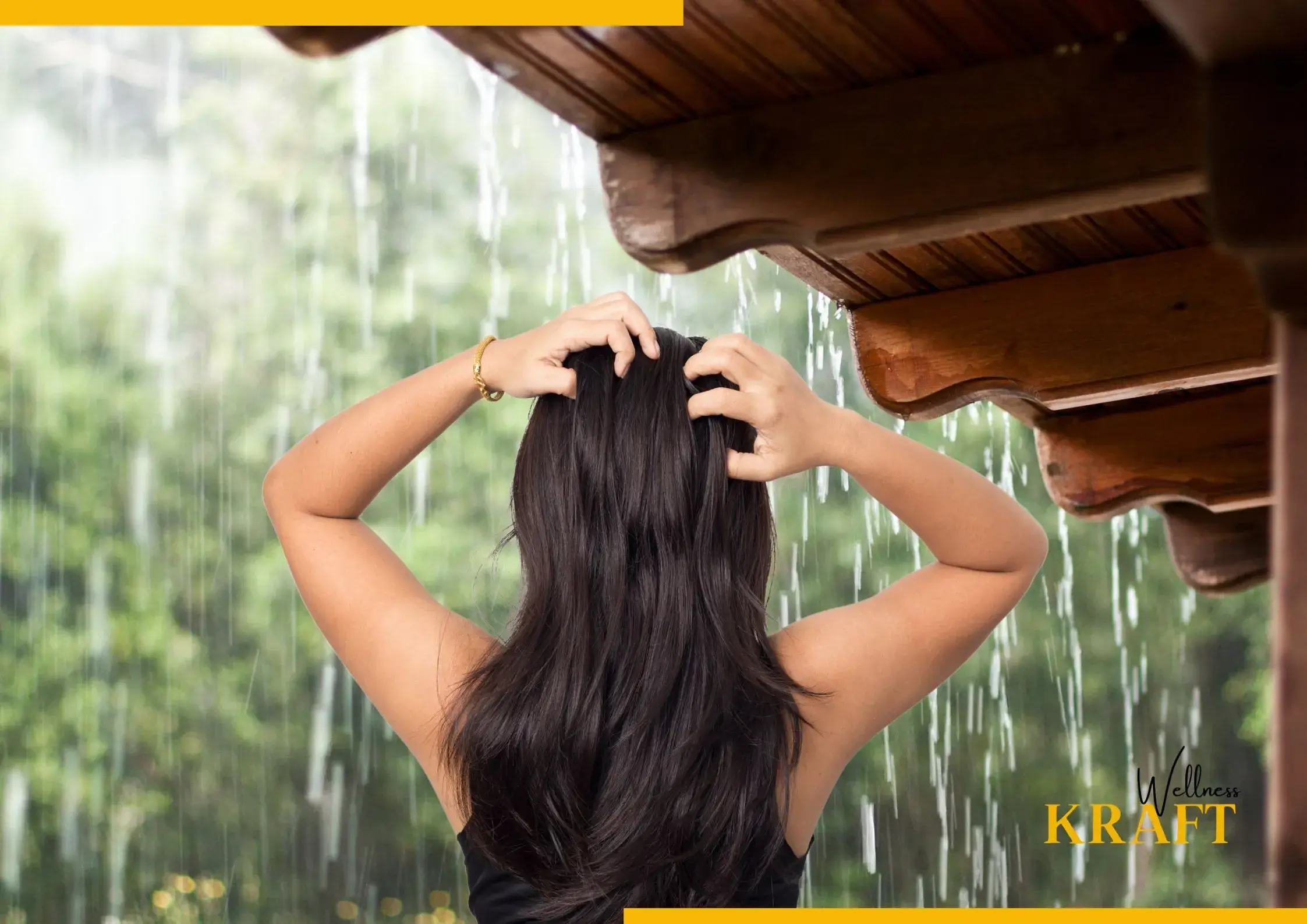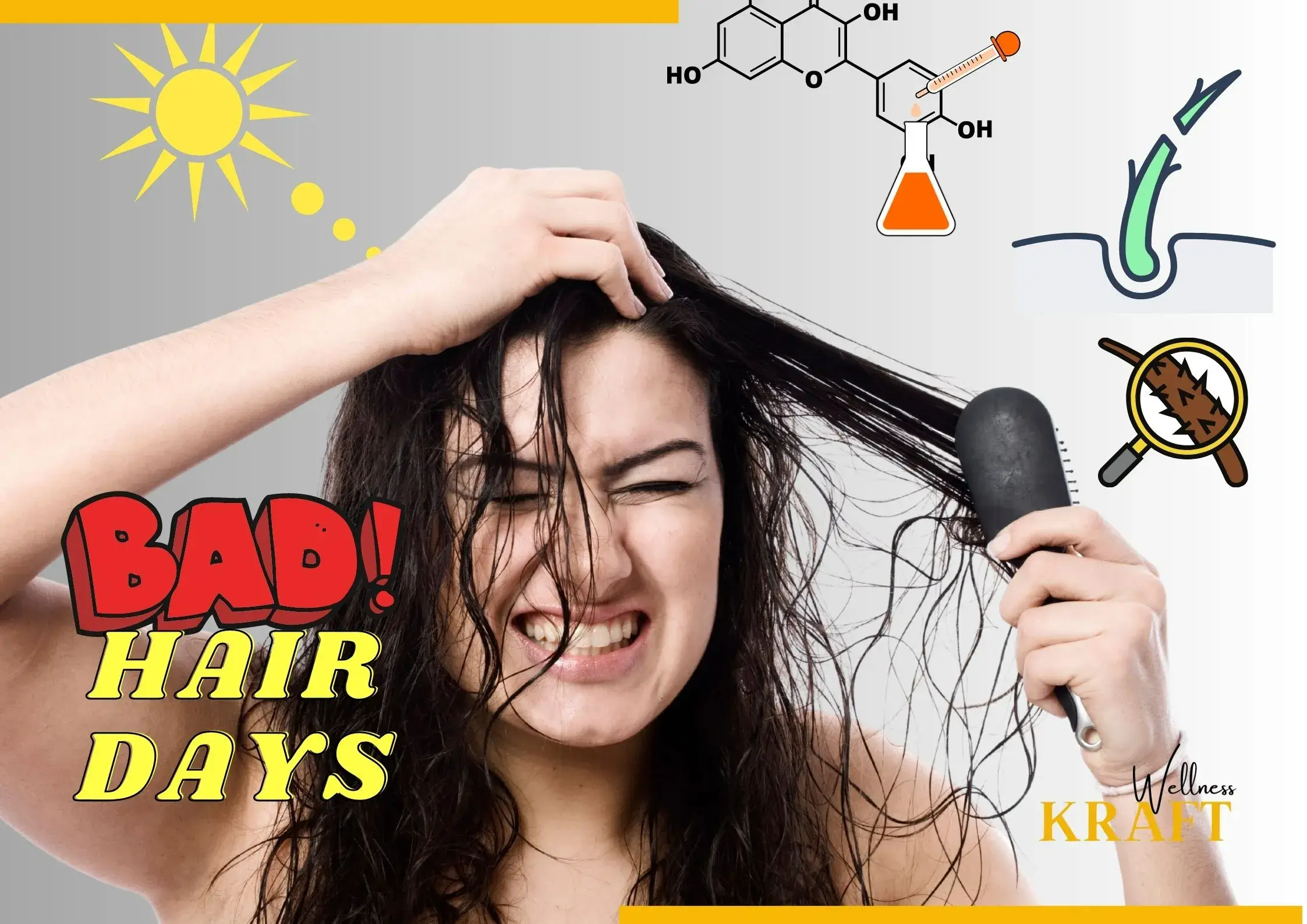Table of Contents
Introduction
Frizzy hair can be one of the most irritating hair concerns, making your hair appear dry, tangled, and unmanageable. Thankfully, you may regain your hair’s smooth, lustrous texture and fight frizz with the help of both store-bought and homemade solutions. This article will discuss what causes frizz, how to fix it at home, 10 Powerful Anti-Frizz Solutions You Need to try and how to keep frizz from spoiling your hairstyle.
Why Does Hair Get Frizzy?
When your hair’s protective exterior layer, the cuticle, becomes permeable to water, moisture can cause frizz. This causes the hair strands to swell, giving the hair a frizzy look. The following are the primary causes of frizzy hair.
- Humidity: The most prevalent reason for frizzy hair is humidity when airborne moisture penetrates the shaft.
- Lack of Moisture: Dry hair will absorb moisture from the surroundings, leading to frizz.
Excessive use of heat-styling tools can deplete moisture and pull the cuticles, causing heat damage. - Chemical Treatments: Frizz is a side effect of chemical treatments like relaxing, perming, and colouring hair. These treatments damage the hair shaft, eventually leading to frizz.
- Harsh Hair Products: Shampoos and conditioners containing sulfates or alcohol can dry out hair and cause frizz.
Internal Factors That Cause Frizz in Hair: Is It Hereditary?
Frizzy hair results from several internal elements in the body and external influences like humidity and heat. These internal elements can impact the hair’s ability to maintain moisture, elasticity, and overall health, leading to frizz. Knowing the internal reasons for frizz helps you adopt a more comprehensive approach to hair care, even though it can be managed.
1. Genetics and Heredity
Yes, there is a genetic component to frizzy hair. The role of genetics in defining hair texture and form is substantial. You may be more prone to frizz if you come from a family with frizzy or curly hair. Hair can be straight, wavy, or curly depending on the genetically determined shape of the hair follicle. The natural oils from the scalp have a more difficult time in the hair shaft of curly hair, leading to dryness and making it more prone to frizz.
Research Findings: The study’s results, published in the Human Molecular Genetics journal, indicate that differences in the trichohyalin gene are linked to hair texture and curliness, which can lead to frizz.
2. Hormonal Imbalance
The body’s hormonal fluctuations, especially those involving thyroid hormones, have the potential to alter hair texture and induce frizz. As levels of stress hormones like cortisol and estrogen rise and fall, the scalp may stop producing sebum, the hair’s natural moisturizer. This can lead to dry, frizzy hair, especially during puberty, pregnancy, or menopause.
Research Findings: A study published in the Journal of Clinical Endocrinology and Metabolism found that thyroid hormone levels have been linked to changes in hair texture, including dryness and frizz.
3. Nutritional Deficiencies
The health of your hair depends heavily on nutrients like vitamins, minerals, and fatty acids. Deficiencies in minerals like iron and zinc and vitamins like B-complex and vitamin D can weaken hair, reduce suppleness, and make it more prone to frizz.
Research Findings: A diet low in critical fatty acids (like omega-3 and omega-6) can make hair more prone to dryness and frizz.
4. Dehydration
Hydration is crucial for healthy hair. When you’re not getting enough water in your body, it shows in your hair and scalp. Dry, brittle hair more prone to frizz might result from this. Drinking lots of water is essential for internally hydrated hair.
5. Stress
Hormone levels, primarily cortisol, can shift when the body is under chronic stress. Hair may become drier and more prone to frizz, which can reduce the scalp’s natural oil production. Stress can also set off problems like telogen effluvium, which causes clumps of hair to fall out, leading to frizz and uneven hair texture.
6. Scalp Health
The condition of your scalp affects the texture of your hair. When the scalp is in good health, it produces just the proper quantity of sebum, a natural oil that helps moisturise the hair. On the other hand, dandruff, eczema, and seborrheic dermatitis can lead to dry hair and frizz if the scalp is not in good health.
Which climate region do people find more frizzy hair in?
In humid climates, where air moisture levels are higher, frizzy hair is more typical. Humidity causes hair to absorb moisture from the air, leading to the shaft expanding, which lifts the cuticle and results in frizz. Due to the persistently high humidity levels in these places, those who live in tropical and subtropical regions, like sections of Southeast Asia, the southern United States, Central and South America, and coastal areas, are more likely to develop frizzy hair.
Because of the absence of moisture in the air, people who live in dry climates may have less frizz. Extreme dryness, however, can still lead to brittle and frizzy hair because of a lack of moisture, especially if correct hair care practices aren’t maintained. Although dryness can also cause hair frizz in dry climates, it is more prevalent in humid climates.
Top Anti-Frizz Home Remedies
1. Oil Extracted from Coconuts
Coconut oil is a great natural hair moisturiser. Its tiny molecular size makes it ideal for penetrating the hair shaft, where it can hydrate and lessen frizz.
How to use:
- Gently heat a little coconut oil.
- Focus on the ends and apply them to moist hair.
- Do not rinse with harsh shampoo until 30 minutes have passed.
2. Avocado Hair Mask
Avocados are rich in vitamins and minerals, which help nourish the hair and reduce frizz. Coating the hair with avocados’ natural oils also helps keep moisture in.
How to use:
- Mix two tablespoons of olive oil with one ripe avocado that has been mashed.
- After your hair is damp, apply the mixture.
- Rinse well after 30 minutes of application.
3. Apple Cider Vinegar Rinse
Apple cider vinegar softens and glosses hair and balances its pH level. It also tames frizz and aids in sealing the cuticles.
How to use:
- Combine equal parts water and apple cider vinegar.
- Apply the mixture to your hair after shampooing it out.
- Just let it sit for a few minutes before giving it a quick rinse in cold water.
4. Honey and Yogurt Mask
Yoghurt helps moisturize and smoothen the hair, while honey is a humectant, which means it locks in moisture.
How to use:
- Combine 1/2 cup of plain yoghurt with two tablespoons of honey.
- Focusing on the ends, apply the mask to your hair.
- Rinse it thoroughly with water after 20 to 30 minutes of exposure.
5. Aloe Vera Gel
Aloe vera is a popular choice because of its calming and hydrating effects. It also lessens frizz by moisturizing the hair and smoothing the cuticle.
How to use:
- Wet your hair and apply a generous amount of aloe vera gel.
- Rinse with warm water after letting it sit for 15 to 20 minutes.
6. Argan Oil
Argan oil, rich in fatty acids and vitamin E, helps moisturize and protect hair from environmental damage.
How to use:
- Apply some argan oil to your damp hair after washing it.
- Keep styling as usual, and you’ll find that your hair is softer and less prone to frizz.
7. Egg and Olive Oil Treatment
Olive oil adds intense moisture, while eggs’ protein content fortifies hair.
How to use:
- Incorporate two tablespoons of olive oil into a beaten egg mixture.
- After applying it to your hair, use a shower cap to keep the mix in place.
- Rinse with cold water after 30 minutes of use.
8. Bananas and Honey
While honey seals in moisture, bananas, which are rich in potassium, soften the hair.
How to use:
- Two tablespoons of honey and one mashed banana make a delicious mix.
- Put the mixture on your hair, leave it on for 20 minutes, and then rinse it with water.
9. Shea Butter
Shea butter is an all-natural emollient that helps to tame frizzy hair and smooth it.
How to use:
- Apply shea butter on the ends of your hair after warming it slightly.
- For frizz control, leave it on as an after-wash treatment.
10. Rice Water Rinse
Rice water is rich in vitamins and amino acids to smoothen the hair cuticle and reduce frizz.
How to use:
Make sure to rinse your hair with rice water after shampooing.
Rinse with water after letting it sit for 15 to 20 minutes.
Foods to Control and Overcome Frizzy Hair
Your diet is king for keeping your hair healthy and manageable in texture. Consuming foods rich in vitamins, minerals, and essential fatty acids will help nourish your hair from the inside out, reduce frizz, and increase shine. The top foods that help with frizzy hair control and solutions are as follows:
- Avocados: Avocados are rich in healthy fats, vitamin E, and biotin, all of which help to hydrate and maintain hair health. These nutrients strengthen the hair shaft and make hair less prone to frizz.
- Salmon: Omega-3 fatty acids, essential for supporting scalp and hair health, are abundant in salmon. Omega-3s help reduce inflammation on the scalp, moisturize the hair, and increase hair elasticity, all of which help prevent frizz.
- Eggs: Proteins and biotin, both important for the health and strength of hair, are abundant in eggs. Biotin helps to strengthen hair by reducing frizz and breakage.
- Nuts (almonds, walnuts, and brazil nuts): Nuts are rich in vitamin E, selenium, and omega-3 fatty acids. They enhance scalp health and moisturise hair. They also reduce frizz and help shield hair from harmful elements.
- Sweet Potatoes: Sweet potatoes are abundant in beta-carotene,, one of the body’s primary sources of vitamin A. The sebum that your scalp and hair produce with the help of this vitamin helps to naturally moisten both the scalp and hair, hence reducing frizz.
- Spinach: Iron, vitamins A and C, and spinach. Iron facilitates the healthy growth of hair follicles by providing oxygen, and vitamins A and C help to produce sebum, which helps to prevent frizz and dryness.
- Berries (strawberries, blueberries, raspberries): Vitamin C is essential for synthesising collagen, and antioxidants are abundant in berries. Vitamin C helps absorb iron, ensuring healthy, frizz-free hair, while collagen fortifies and shields hair from harm.
- Oats: Oats are rich in fibre, zinc, and iron, all of which benefit hair health overall. Zinc is essential for promoting hair health and reducing inflammation that can lead to dry, frizzy hair.
- Flaxseeds: Flaxseeds are abundant in omega-3 fatty acids, which are essential for reducing frizz and keeping hair moisturized. You can apply flaxseed oil topically to get smoother hair or eat flaxseeds by putting them in salads or smoothies.
- Carrots: Carrots are rich in vitamin A, which helps the scalp produce natural oils. This organic sebum keeps hair hydrated and helps to avoid frizz and dryness.
Best Anti-Frizz Oils for Smooth, Manageable Hair
Using oils is one of the most effective ways to control frizz and hydrate your hair. These oils help seal moisture into the hair shaft, smooth the cuticle, and protect hair from environmental factors contributing to frizz. Here are some of the best anti-frizz oils:
1. Argan Oil
Argan oil is known as “liquid gold” for hair due to its high antioxidants, essential fatty acids, and vitamin E content. It helps smooth frizz, add shine, and improve hair elasticity without making it greasy.
- Best for: All hair types, especially dry, frizzy, or damaged.
- How to use: Apply a few drops to damp or dry hair, focusing on the ends.
2. Coconut Oil
Coconut oil is rich in lauric acid and quickly penetrates the hair shaft to provide deep moisture. It reduces protein loss in hair, keeping it smooth, shiny, and frizz-free.
- Best for: Thick, curly, or coarse hair.
- How to use: Massage it into your scalp and hair as a pre-wash treatment. Leave it on for 30 minutes overnight, then rinse.
3. Almond Oil
Almond oil is lightweight but deeply nourishing. It contains vitamin E, omega-3 fatty acids, and magnesium, which help soften the hair, prevent breakage, and reduce frizz.
- Best for: Fine to medium hair.
- How to use: Use a few drops on dry or damp hair to tame flyaways and add smoothness.
4. Jojoba Oil
Jojoba oil closely mimics the natural oils the scalp produces, making it an excellent moisturizer for hair. It helps reduce frizz by balancing the scalp’s oil production, hydrating the hair without leaving it oily.
- Best for: Oily or fine hair types.
- How to use: Apply to damp hair or use it as a hot oil treatment.
5. Olive Oil
Olive oil is a heavier oil that deeply conditions and smooths frizzy hair. It contains antioxidants and healthy fats that help strengthen the hair and reduce split ends, leaving hair soft and manageable.
- Best for: Thick, curly, or dry hair.
- How to use: Use it as a leave-in treatment or as a hair mask, applying to damp hair and rinsing after 30 minutes.
6. Grapeseed Oil
Grapeseed oil is lightweight and rich in vitamin E, making it perfect for sealing moisture into the hair without weighing it down. It also helps control frizz and adds a subtle shine.
- Best for: Fine to medium hair.
- How to use: Apply a small amount to dry hair to tame frizz and smooth flyaways.
7. Avocado Oil
Avocado oil is packed with monounsaturated fats, penetrating the hair and providing long-lasting moisture. It also contains vitamins A, D, and E, which help to repair damaged hair and reduce frizz.
- Best for: Dry, damaged, or curly hair.
- How to use: Use it as a pre-shampoo treatment or add a few drops to your conditioner.
8. Castor Oil
Castor oil is known for its thick consistency and ability to lock in moisture, making it great for preventing frizz. It contains ricinoleic acid and omega-6 fatty acids, which improve scalp health and promote smooth, healthy hair.
- Best for: Very dry or coarse hair.
- How to use: Mix with a lighter oil (like coconut or almond oil) and apply to damp hair.
9. Macadamia Oil
Macadamia oil is rich in fatty acids and provides intense hydration for dry, frizzy hair. It helps smooth the hair cuticle, reduce split ends, and restore shine to dull hair.
- Best for: Curly or dry hair.
- How to use: Apply a few drops to the ends of your hair or use it as a leave-in treatment.
10. Baobab Oil
Baobab oil contains omega-3, 6, and 9 fatty acids and vitamins A, D, E, and F. It helps smooth the hair, control frizz, and protect against heat damage.
- Best for: Damaged, frizzy hair.
- How to use: Use it as a finishing oil on damp or dry hair for added shine and smoothness.
How to Choose the Right Anti-Frizz Shampoo
Hair type: When choosing a shampoo, consider your hair’s thickness, curl pattern, and overall texture. Different formulas work best for fine, thick, or curly hair.
Ingredients: To tame frizz, use nourishing and moisturizing ingredients like argan oil, shea butter, and keratin.
Sulfate-free: If you have colour-treated or sensitive hair, opting for a sulfate-free shampoo can prevent stripping and help maintain moisture.
Climate: If you live in a humid area, shampoos with anti-humidity properties, like those containing silicone alternatives or sealing oils, can help keep frizz at bay.
Key Takeaways
- Drink plenty of water to avoid frizz, and hydrate your hair often.
- Avoid over-washing your hair; too much shampooing might rob it of its natural oils.
Use a microfiber rather than a standard towel to dry your hair more effectively. The reduced friction lessens frizz. - Skip the sulfates in your shampoo and select a sulfate-free shampoo to avoid making frizz worse.
- Minimize heat tools for hair finishing. Excessive heat styling can dry out your hair, making it frizz-prone.
Frequently Asked Questions (FAQs)
1. What causes frizzy hair?
Dryness, humidity, and damage to the hair cuticle are all factors that contribute to frizzy hair because they allow moisture to swell the hair shaft.
2. Can I permanently get rid of frizz?
Consistent care and the correct products can considerably reduce the appearance of frizz, although it cannot completely eliminate it.
3. How often should I use coconut oil for frizz control?
Try deep conditioning with coconut oil once or twice weekly for healthy, lustrous hair that doesn’t frizz.
4. Is apple cider vinegar safe for coloured hair?
Apple cider vinegar can be safely used on dyed hair. To prevent damage, make sure you dilute it correctly.
5. Why does humidity make my hair frizzy?
Humidity causes hair to absorb extra moisture from the air, which causes it to swell and produce frizz.
6. Can using a silk pillowcase reduce frizz?
Sleeping with a silk pillowcase can help minimize friction and decrease hair breakage, reducing frizz.
7. Are there any foods that help control frizz?
Salmon and flaxseeds, rich in omega-3 fatty acids, can help reduce frizz and increase hair moisture over time.
8. Can frizzy hair be a sign of damage?
Yes, frizzy hair can be a sign of damage caused by over-styling, chemical treatments, or a lack of enough hydration.
9. Can I use regular conditioners to reduce frizz?
Yes, but you’ll get far better results using a conditioner specifically made to hydrate dry or frizzy hair.
10. Is there a way to prevent frizz without using products?
Air-drying your hair, minimizing heat styling, and maintaining a natural moisture balance can keep frizz at bay without resorting to harsh styling products.
Concluding Thoughts
Frizzy hair is manageable. You can reduce frizz and keep your hair healthy and shiny by learning the causes and applying easy home treatments like avocado masks, coconut oil rinses, and apple cider vinegar. The key to taming frizz is a consistent hair care regimen that includes preserving your hair from environmental damage.
For more information and references to the latest studies on anti-frizz solutions, check out the research articles:
These resources provide deeper insights into the underlying causes and solutions for frizzy hair.










